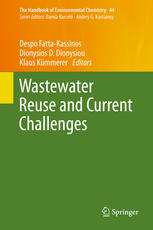

Most ebook files are in PDF format, so you can easily read them using various software such as Foxit Reader or directly on the Google Chrome browser.
Some ebook files are released by publishers in other formats such as .awz, .mobi, .epub, .fb2, etc. You may need to install specific software to read these formats on mobile/PC, such as Calibre.
Please read the tutorial at this link: https://ebookbell.com/faq
We offer FREE conversion to the popular formats you request; however, this may take some time. Therefore, right after payment, please email us, and we will try to provide the service as quickly as possible.
For some exceptional file formats or broken links (if any), please refrain from opening any disputes. Instead, email us first, and we will try to assist within a maximum of 6 hours.
EbookBell Team

4.0
6 reviewsThis volume discusses the current challenges related to the reuse of wastewater. It reviews the analytical methodologies for evaluating emerging contaminants and their transformation products, the sensitivity of various bioassays for assessing the biological effects of treated wastewater, and the bioavailability and uptake of organic contaminants during crop irrigation. It describes in detail the physicochemical and microbiological alterations in soil resulting from irrigation with treated urban wastewater, and discusses our current understanding of antibiotic resistance in wastewater treatment plants and in downstream environments. The book also includes an analysis of the effect of wastewater entering drinking water sources and production, and provides updated information on wastewater reuse for irrigation in North Africa. It presents an important integration tool for water recovery, known as water pinch analysis, and finally showcases two other examples of reuse – one in the paper industry and one in landfill management. It is of interest to experts from various fields of research, including analytical and environmental chemistry, toxicology and environmental and sanitary engineering.